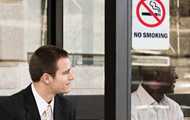Community Profile: Washington, DC
This program is no longer funded. Learn more about current DCH programs.
Tobacco Use Prevention

“THE TIMING OF CPPW WAS PERFECT, AS IT HAS PROVIDED THE RESOURCES, TRAINING, AND COLLABORATION THAT WE NEEDED TO GO TO THE NEXT LEVEL IN OUR FIGHT AGAINST HEALTH DISPARITIES CAUSED BY TOBACCO USE.”
— Regina Renteria-Weitzman, Chair, DC Tobacco Free Coalition
Download profile PDF[PDF–1.02MB]
Additional Resources
For more information, please visit
www.doh.dc.gov/
“I LOVE WHAT YOU ALL ARE DOING TO TURN HOWARD TOBACCO-FREE. I HAVE ASTHMA AND I CAN'T STAND WALKING THROUGH THE SMOKE CLOUDS.”
— DC resident and Howard University student
Communities Putting Prevention to Work (CPPW) is an initiative designed to make healthy living easier by promoting environmental changes at the local level. Through funding awarded by the Centers for Disease Control and Prevention in 2010, a total of 50 communities are working to prevent obesity and tobacco use—the two leading preventable causes of death and disability.
Community Overview
Washington, DC, is tackling tobacco use throughout the community, which is home to more than 600,000 residents. With an adult smoking rate of 14.6%, tobacco use is a concern. Tobacco-use rates are disproportionately high among certain populations in Washington, DC.
Smoking prevalence among black adults in DC is 20.3%. Rates among lesbian, gay, bisexual, and transgender adults in the city are even higher at approximately 34%. In addition to tobacco use prevention efforts aimed at the community's entire population, certain initiatives target these high-risk groups.
Top of PageCommunity Successes
If healthy options are not available, then healthy living is not possible. With the support of the CPPW initiative, Washington, DC has implemented a variety of changes throughout the community to make healthy living easier.
To decrease tobacco use, Washington, DC:
- Started to collaborate with stakeholders in the community to address tobacco use among certain populations, including black men and lesbian, gay, bisexual, and transgender residents. As part of this effort, DC is working toward transitioning universities and multi-unit housing to become smoke-free.
- Began efforts to decrease access to tobacco products, especially around schools and public-housing developments where tobacco use is highest.
- Initiated a community survey to assess the density of unhealthy advertising across DC neighborhoods. A community wellness survey is also underway to provide additional data to support this project. Results will inform planning efforts to reduce tobacco use and exposure.
(The list above is a sample of all activities completed by the community.)
Top of PageCampaign Raises Awareness of 1-800-QUITNOW Quitline
Washington, DC, is providing support to help tobacco users overcome their addiction. DC is planning the development of a public awareness initiative to encourage smokers to use the 1-800-QUITNOW quitline. The quitline services include counseling sessions with certified tobacco treatment specialists, free nicotine patches, and a local number for Spanish-speaking residents that connects directly to the quitline.
Top of PageLeadership Team
The leadership team includes high-level community leaders from multiple sectors, who have the combined resources and capacity to make healthy living easier. Members of Washington DC's leadership team are key agents for change in their community. The leadership team includes representatives from the following organizations:
- DC Commission on Arts and Humanities
- DC Department of Consumer and Regulatory Affairs
- DC Department of Health
- DC Department of Healthcare Finance
- DC Department of Housing and Community Development
- DC Department of Human Services
- DC Department of Mental Health
- DC Department of Parks and Recreation
- DC Department of Transportation
- DC Mayor's Office
- DC Metropolitan Police Department
- DC Office of Planning
- DC Office of the State Superintendent for Education
- DC Public Housing Authority
- Page last reviewed: October 25, 2013
- Page last updated: October 25, 2013
- Content source:


 ShareCompartir
ShareCompartir